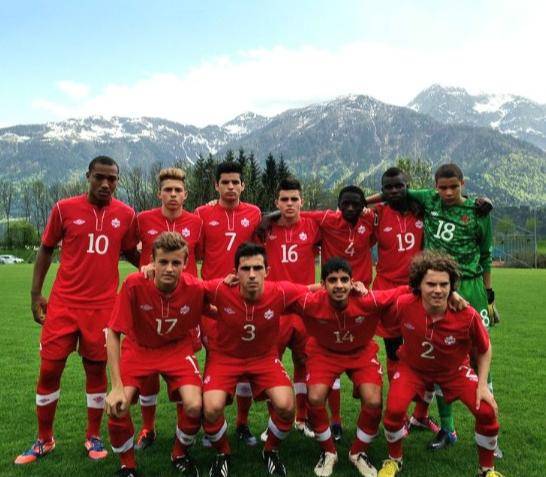It’s March, and you know what that means – outdoor soccer/football is quickly approaching!
What does that mean?
Soccer tryouts are coming up!
We know how stressful soccer tryout season can be for players (and their parents), so we put together an extensive list of 16 things to consider to help increase confidence, lessen the anxiety, and give yourself the best chance of proving your skill and ability as a player!

Playing for Canada was a beautiful honour. Every camp, session, and game felt like a tryout, and the pressure to perform at your best on a consistent basis was immense.
1) Show Up Early
Showing up 20 – 30 minutes early gives the coaches the impression that you are excited to be there, prepared for the session/match ahead, and doing all you can to set yourself up for success.
2) Greet The Coaches Before The Session
If you’re a returning player, no problem, be sure you say hello to the coach before the trial and offer a handshake or fist bump.
If you’re a new player to the club, take an opportunity before the football begins to introduce yourself with your name, a handshake, and let them know you’re excited about the opportunity.
3) Greet The Other Players
As a returning player, offer a quick greeting as you see your teammates, even if it’s just a ‘hello, how’re ya doing?’
As a new player, introducing yourself to as many of the other players as possible is super important, and getting to know everyone’s name is even more crucial!
Ultimately, if you’ve exchanged names, players will feel more comfortable giving you the ball, which gives you more opportunity to impress, and it shows initiative to the coaches that you really want to be part of their team.

A cool photo with Steve Nash (Multi NBA MVP) and our team in 2014 when I was playing with the Vancouver Whitecaps Academy. Playing for the Whitecaps meant you had to be one of the best in Western Canada, so you were constantly demanded to perform at your best.
4) Reflect On Your Strengths
Take the time before your tryouts to reflect on your strengths as a footballer, what they are, and how best you can showcase these strengths to the coaches.
This isn’t the time to work on your weaknesses, as you want to show your coaches your best work so you can impress.
5) Know Your Position
Although it’s a valuable trait to be versatile and be able to play multiple positions, at tryouts be sure you know what position you want to play when the coaches ask.
Think about what position you feel most comfortable in and where on the pitch you can showcase your best traits as a player.
6) Always Want The Ball
There’s nothing better as a coach than seeing a player who is consistently seeking the ball throughout training and games.
Be loud and demand the ball whenever possible, and show you’re confident in yourself and want to take responsibility as a player.
7) Always Look Forward First
When in possession of the ball, always try and at least look to go forward first.
Look to take responsibility and progress the ball forward, whether with a pass, dribble, or first touch.
Coaches always want players who are at least considering a forward option first, rather than taking the easy sideways or backward option right away.
8) Be Coachable
As a coach, you want players on your team who can listen, understand, and take action, based on the information you gave them.
If a coach gives you a tip or information during your tryout, be sure to go out and try to apply the insight they’ve given you.
Even if it doesn’t come off perfectly, the coach will appreciate you attempting to do the right thing and integrate their advice into match play.
9) One Thing At A Time
It’s easy to get overwhelmed at soccer tryouts with players, coaches, parents, and all the questions regarding the future season, but one of the easiest ways to break this down is to focus on one thing at a time.
Narrow your focus down to each first touch, pass, dribble, defending situation, and/or shot.
Focus on one thing at a time, and take pride in trying to successfully perform each action on the field.
10) Focus On What You Can Control
Think about all the things that are in your control – your first touch, your dribbling, your work ethic with and without the ball, your communication, your leadership, and your attitude.
Your attention and brain can only consider so many factors at once, so try not to think too much about what everyone else is saying or might be thinking.
Focus on the factors you can control, and do these to the best of your ability.

College soccer is a high pressure environment, with hundreds of thousands of scholarship dollars on the line each season. Some players can earn up to $50 000 per year in scholarship funds, so you have to perform to the best of your ability every game.
11) Be (Selectively) Selfish
At the end of the day, it’s a tryout, and you want to do all you can to impress the coaches.
Soccer is all about the team, don’t get me wrong, but finding the times to selfishly play that forward pass, take that shot, or make that aggressive challenge is important to display your confidence as a footballer.
Be selectively selfish, and take matters into your own hands when appropriate.
12) Your Reaction When You Give Away The Ball
Oftentimes, a coach won’t be that upset when a player gives away the ball, especially if that player was trying to do the right thing.
The reaction from the player has more potential of upsetting the coach.
Does the player throw their hands up in the air, blame someone else, or stop playing entirely?
Or are do they react by trying to win the ball back, keep their chest up, and look to get on the ball again and try to do the right thing?
13) Tackle Aggressively, But Smart
Whether a striker, midfielder, defender, or goalkeeper, ensure you’re going into your battles with an aggressive intent of winning your duel and getting possession back for your team.
Don’t go into tackles half-heartedly – once you make the decision to go into a challenge, be sure you stick to your guns and make the play.
We’re not saying to play dirty or make tackles with the intent to hurt anyone, but play aggressively and do what you can to win your physical battles.
14) Show Up Fit
Most players are finishing up the indoor season and transitioning right into outdoor right away, so fitness shouldn’t be too much of an issue.
That being said, you do want to start ramping up your fitness as you get closer to pre-season and having to play on a full sized pitch (for my Canadian’s coming out of winter season).
Ensure you’re completing plenty of anaerobic and aerobic training, as well as speed and agility before the outdoor season.
15) Be Excited About A New Opportunity
Whether it’s a new club or just the thought of a new season, consider this a fresh start and the opportunity to take your game to the next level.
Go out of your way to train more often, work a little harder, and do more of what you can to make this season, as well as future seasons, successful.
16) Take Responsibility For Feedback As A Player
As a player, you need to have the confidence to go up to coaches and ask for performance feedback.
Don’t be afraid after a session to approach the coach and ask if there’s a way you can improve your game or something you can work on for the next tryout, so you can give yourself the best opportunity to impress.
This also shows your coaches that you’re interested in learning, and improving, and you’re taking responsibility for your development as a player.



